![]()
![]()
![]()
Use LEFT and RIGHT arrow keys to navigate between flashcards;
Use UP and DOWN arrow keys to flip the card;
H to show hint;
A reads text to speech;
27 Cards in this Set
- Front
- Back

|

|
|

|
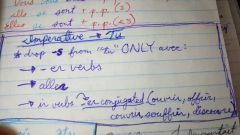
|
|

|
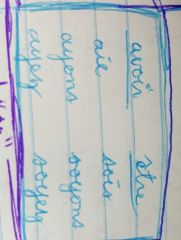
|
|
|
What us the order of pronouns (P.O.I, en, y, P.O.D.[the], P.O.D. [he/she/us/me/you/vous]) |
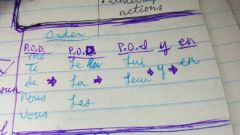
|
|
|
Parler: direct or indirect? |
Parler à. Indirect |
|
|
Telephoner: direct or indirect? |
Telephoner à. Indirect. |
|
|
Envoyer: Direct or Indirect? |
Envoyer à. Indirect. |
|
|
Donner. Direct or Indirect? |
Donner à. Indirect |
|
|
Demander: Direct or Indirect? |
Demander à. Indirect |
|
|
Rendre visite: Direct or Indirect? |
Rendre visite à. Indirect |
|
|
Offrir: Direct or Indirect? |
Obeir à. Indirect |
|
|
Expliquer. Direct or Indirect? |
Expliquer à. Indirect |
|
|
What is the question for P.O.D.s? |

|
|

What pronouns are these? |

P.O.Direct |
|

|

P.O.Indirect |
|
|
What pronouns asks quoi/ de quoi |
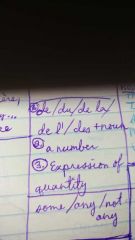
En |
|
|
What is the imperative forms (3) of avoir? |
Tu aie Nous ayons Vous ayez |
|
|
What are the 3 imperative forms of Être? |
Tu sois Nous soyons Vous soyez |
|
|
When does the pronoun agree with the direct object when using avoir? |
Only when using P.O.D. avec passe compose. |
|
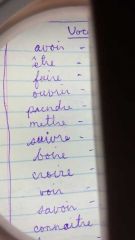
What is the definition and P.P.? |
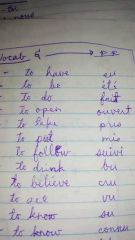
|
|
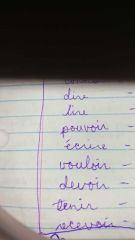
What is the definition and the p.p.? |

|
|
|
Être- imparfait form: |
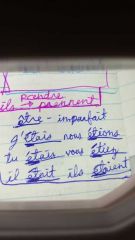
|
|

define: |

|
|
|
Do verbs with "se" use être or avoir? |
Être |
|
|
Accessories on verbs and adjectives must agree with subject when using: Avoir or Être? |
When using être. -> Ex: Nous sommes descendus. -> Ex: Je suis grande. |
|
|
Inviter: Direct or Indirect? |
Direct |
|
|
Regarder: Direct or Indirect? |
Direct |

